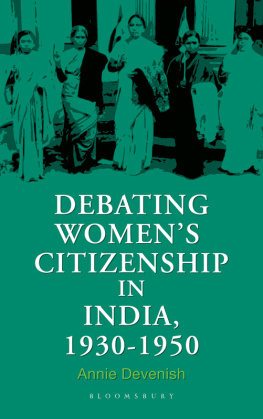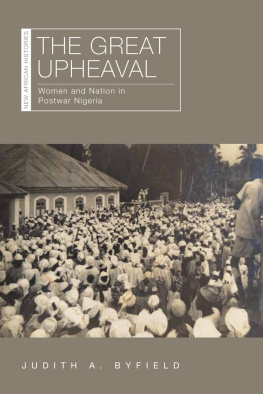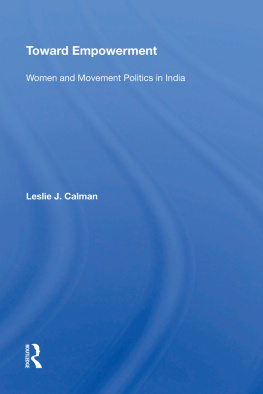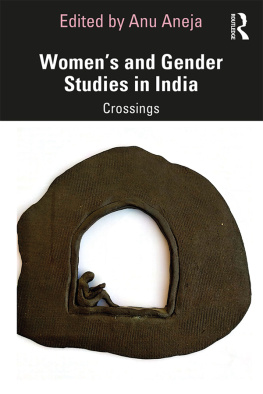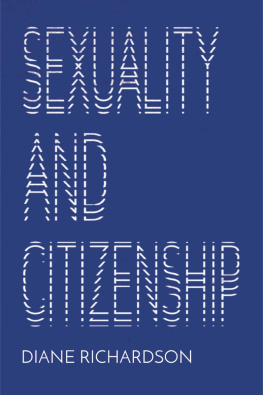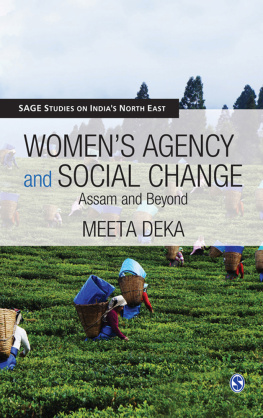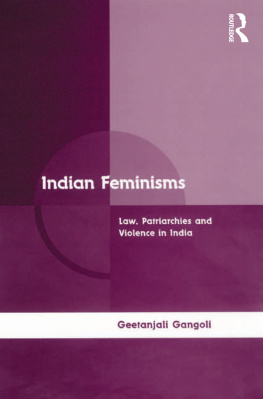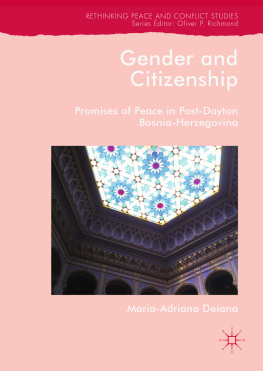Table of Contents

In this amazingly comprehensive and confident history of womens enactment of citizenship in the struggle for and experience of Indian national independence, Annie Devenish has provided readers, historians of India and of women alike, with an entirely new investigation of the years of early nationhood and womens role as agents of change. This book goes a long way into solving the vexing problem of how the vigorous womens activism of the 1920s and 1930s didor did notflow into the creation of the Indian nation, and what historical resources contemporary Indian feminists can turn to in reviving their battle for womens dignity and rights.
Ellen Dubois
Distinguished Professor, History and Gender Studies
Department of Gender Studies
University of California Los Angeles
Womens organisations have made a significant contribution to womens development and empowerment in India. Yet, little scholarly work has so far been done to assess their contribution. This book, therefore, is a welcome addition to the existing literature on the subject. It explores the question of what the coming of independence meant to a generation of feminists and nationalists by focusing on the leading members of two prominent womens organisations of their timethe All India Womens Conference and the National Federation of Indian Women. It draws on autobiographies and oral interviews as well as archival records. It is a very well-researched book and should be read not only by scholars interested in womens studies but by all students of modern Indian history.
Aparna Basu
Former Professor of Modern History
University of Delhi
In this lucid account of the modern Indian womens movement, Annie Devenish invites us to consider the variety of ways that citizenship was conceptualised at the intersection of nationalist and feminist politics at key moments in the history of Indian democracy. Centring both the stories of individual women and the new imaginaries of and for gender that their words and work enabled, Debating Womens Citizenship in India argues for the role of a particularly energetic, strategic cohort of Indian women in shaping the contours of state practice, civil society and the post-war, postcolonial international order all at once.
Antoinette Burton
Professor of History
Department of History
The University of Illinois, Urbana-Champaign
Debating Womens
Citizenship in India
19301960
Debating Womens
Citizenship in India
19301960
Annie Devenish

BLOOMSBURY INDIA
Bloomsbury Publishing India Pvt. Ltd
Second Floor, LSC Building No. 4, DDA Complex, Pocket C 6 & 7,
Vasant Kunj New Delhi 110070
BLOOMSBURY, BLOOMSBURY ACADEMIC INDIA and the Diana logo are trademarks of
Bloomsbury Publishing Plc
First published in India 2019
This edition published 2019
Copyright Annie Devenish, 2019
Annie Devenish has asserted her right under the Indian Copyright Act to be identified as Author of this work
Bloomsbury Academic
An imprint of Bloomsbury Publishing Plc
All rights reserved. No part of this publication may be reproduced or transmitted in any form or by any means, electronic or mechanical, including photocopying, recording, or any information storage or retrieval system, without prior permission in writing from the publishers
Bloomsbury Publishing Plc does not have any control over, or responsibility for, any third-party websites referred to or in this book. All internet addresses given in this book were correct at the time of going to press. The author and publisher regret any inconvenience caused if addresses have changed or sites have ceased to exist, but can accept no responsibility for any such changes
ISBN: HB: 978-9-3882-7195-0; eBook: 978-9-3882-7196-7
2 4 6 8 10 9 7 5 3 1
Created by Manipal Digital Systems
Bloomsbury Publishing Plc makes every effort to ensure that the papers used in the manufacture of our books are natural, recyclable products made from wood grown in well-managed forests. Our manufacturing processes conform to the environmental regulations of the country of origin.
To find out more about our authors and books visit www.bloomsbury.com and sign up for our newsletters
Contents
| AIIMS | All India Institute of Medical Sciences |
| AISF | All India Students Federation |
| AIWC | All India Womens Conference |
| CA | Constituent Assembly |
| CHR | the Commission on Human Rights |
| CPI | Communist Party of India |
| CSWB | Central Social Welfare Board |
| CSW | Committee on the Status of Women |
| ECOSOC | The Economic and Social Council |
| FPAI | Family Planning Association of India |
| ICCW | Indian Council of Child Welfare |
| INC | Indian National Congress |
| LGBTI | Lesbian, Gay, Bisexual, Transgender and Intersex |
| MARS | Mahila Atma Raksha Samiti |
| MCH | Maternal and Child Health |
| MNML | Madras Neo-Malthusian League |
| MP | Member of Parliament |
| NAACP | National Association for the Advancement of Coloured People |
| NCCW | National Council of Child Welfare |
| NCWI | National Council of Women in India |
| NFIW | National Federation of Indian Women |
| NPC | National Planning Committee |
| NWFP | North West Frontier Province |
| PC | Planning Commission |
| SEWA | Self Employed Womens Association |
| UDHR | Universal Declaration of Human Rights |
| UNICEF | United Nations International Childrens Emergency Fund |
| WHO | World Health Organisation |
| WIDF | Womens International Democratic Federation |
Citizenship in India today remains a highly contested terrain. There is ongoing lobbying for the re-categorisation of Scheduled Castes and Tribes (SCTs), as various communities seek access to state resources and entitlements. Civil society groups are challenging the National Register of Citizens (NRC), which effectively strips four million people, mainly Muslim Bengalis in the north-eastern state of Assam, of their citizenship because they are unable to prove that they came to the state before neighbouring Bangladesh declared independence in 1971. LGBTI petitioners, while celebrating the September 2018 Supreme Court ruling decriminalising Section 377 of the Indian Penal Code, are also bracing themselves for the ongoing battle of changing conservative social attitudes, which continue to discriminate against queer communities. Meanwhile, peoples movements across India carry on the fight with state governments and corporations over access to coastal fishing regions, forests, minerals and land in the face of development and dam building projects, asserting their right to local control over natural resources and economic livelihoods.
Indian women are prominently present in such struggles, as well as in many other specific campaigns that are seeking to apply and broaden the meaning of citizenship to their everyday lives. Women are speaking out in academia, the media and politics to demand their right to safety and bodily integrity with the recent arrival of the international anti-sexual harassment #MeToo movement.

